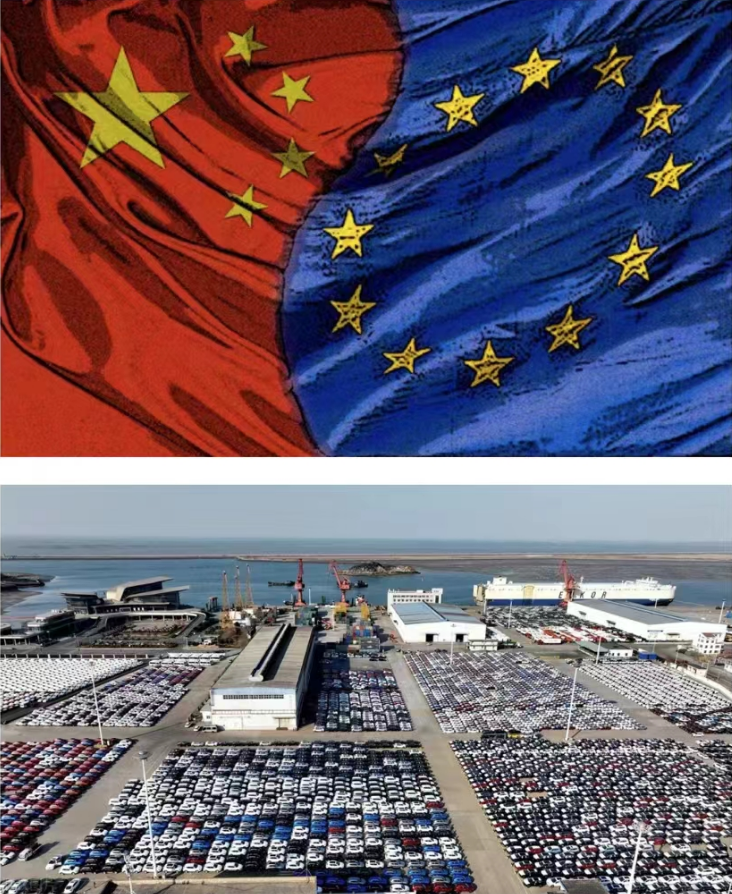The European Union announces a maximum tariff increase of 38.1%!
On the 12th local time, the European Commission (EC) announced in a statement that starting next month, it will impose an additional tariff of up to 38.1% on electric vehicles imported from China. Immediately, the three major German automakers—Volkswagen, Mercedes-Benz, and BMW—responded quickly, opposing the preliminary ruling and the decision to impose additional tariffs.
In the statement, the EC mentioned that the tariffs imposed on three sampled Chinese manufacturers will be 17.4% for BYD, 20% for Geely, and 38.1% for SAIC Group.
For other Chinese car companies that cooperated with the EU’s investigation but were not sampled, an average tariff rate of 21% will be imposed. Companies that did not cooperate with the EU’s investigation will be subject to a 38.1% tariff.

The announcement indicates that if a resolution cannot be reached with China, the additional tariffs will be implemented around July 4th.
Volkswagen Group stated that: “Free and fair trade, as well as open markets, are the foundation for global prosperity, job security, and sustainable growth. As a global company, Volkswagen Group supports and advocates for open, rules-based trade policies. In the long run, imposing countervailing duties is detrimental to the competitiveness of the European automotive industry. We oppose this decision. The current demand for electric vehicles in Germany and Europe is weak. The timing of this decision by the European Commission is not appropriate. For the European, and especially the German automotive industry, this decision does more harm than good.
What Europe needs is a regulatory environment that promotes the transition of the automotive industry to electrification and climate neutrality. We are confident in our products and innovation capabilities. Volkswagen Group actively faces the increasingly fierce international competitive environment, including competition in the Chinese market. Competition will become an opportunity for development and will benefit our customers.”
Mercedes-Benz Group stated: “We have noted the relevant interim measures announced by the EU. Mercedes-Benz has always supported free trade based on WTO rules, including the principle that all market participants should be treated equally. Free trade and fair competition will bring prosperity, growth, and innovation to all parties. Allowing protectionist trends to rise will have negative consequences for all stakeholders. We will closely monitor the developments. Please understand that we will not comment further on the ongoing investigation.”
BMW Group also issued a statement noting that the EU will soon announce new tariff rates on Chinese electric vehicles. BMW Group has a clear stance on anti-subsidy investigations. BMW Group Chairman Oliver Zipse commented on the EU’s tariff measures as follows:
“The European Commission’s decision to impose tariffs on Chinese electric vehicles is a wrong decision. Imposing tariffs will hinder the development of European car companies and harm Europe’s own interests. Trade protectionism will inevitably trigger a chain reaction: tariffs will be met with tariffs, and isolation will replace cooperation. For BMW Group, protectionist measures such as increasing import tariffs cannot help companies enhance their global competitiveness. BMW Group firmly supports free trade.“
According to Reuters, on June 12th local time, the European Commission issued a statement announcing that it will impose an additional tariff of up to 38.1% on electric vehicles imported from China. The European Commission stated that if the EU cannot reach a resolution with the Chinese side through negotiations, the temporary tariff measures will take effect from July 4th.

The European Commission plans to impose a 17.4% tariff on BYD, a 20% tariff on Geely, and a 38.1% tariff on SAIC Group. Other “cooperating companies” will face a 21% tariff, while “non-cooperating companies” will be subject to a 38.1% tariff. Tesla vehicles produced in China may be subject to a separately calculated tariff rate.
Currently, the EU imposes a 10% tariff on all Chinese electric vehicles.
The European Commission claims that an anti-subsidy investigation conducted last year revealed that the Chinese electric vehicle value chain “benefits from unfair subsidies,” resulting in a large influx of related products at “artificially low prices” into the EU, posing an “obvious and imminent threat of harm” to the EU’s electric vehicle industry.
In its statement, the European Commission said it has contacted the Chinese side to discuss the anti-subsidy investigation results and “possible solutions to address the issues.” If a resolution cannot be reached with the Chinese side, the temporary tariff measures will take effect from July 4th. Within four months of the temporary tariffs taking effect, the EU will decide whether to impose permanent tariffs on Chinese electric vehicles.

In October last year, the European Commission announced its decision to launch an anti-subsidy investigation into Chinese electric vehicles. However, according to the Financial Times, there is significant internal division within the EU regarding whether to impose tariffs. Some EU countries, like France, support the investigation and advocate for higher tariffs on Chinese electric vehicles, while others, led by Germany, oppose this measure.
EU officials disclosed that Germany, Sweden, and Hungary do not favor imposing tariffs on Chinese electric vehicles. The German government even attempted to pressure Ursula von der Leyen to abandon the anti-subsidy investigation, but according to a source, Germany’s lobbying efforts were unsuccessful.
The Kiel Institute for the World Economy, a German think tank, estimates that an additional 20% tariff imposed by the EU on Chinese electric vehicles could reduce imports by a quarter. Researchers note that the increase in European electric vehicle production would partially fill the gap, but EU consumers might face higher prices.





